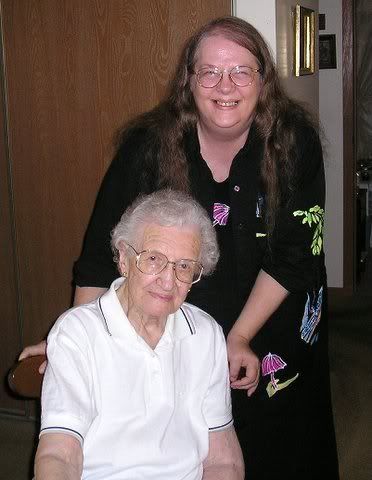Wooo HOOO On the Final Stretch ... Just One Big Paper to Go!!
Topic: u10d3 Artificial IntelligenceSubject: In response to assignment from Ann
Last edited on: June 22, 2006 6:33 AM
Artificial intelligence (AI) is the concept that computers can be taught to simulate thinking as modeled by human beings. At this point, the experts can give computers “highly complex instructions, known as computer programs or even more commonly as software, which tell the computer how to respond to new information” (Sternberg, 2003). There are some people who believe that machines will some day be smarter than human beings, but at this point they need to be taught how to process information. The machines are much faster at making computations than humans and they can process much more information in a small window of time.
The first strand of computer research introduced the Logic Theorist (LT) and then later the General Problem Solver (GPS) by Carnegie-Mellon University. They were “designed to discover proofs for theorems in elementary symbolic logic” (Sternberg, 2003) using means-ends analysis, which meant breaking down the difference between the end of the problem and the beginning of the program. Later MIT developed SHRDLU in 1970, which moved blocks around “its world” by the assistance of a robotic arm (2003).
ELIZA and PERRY were computers that were built at MIT to imitate respectively a therapist and a psychology patient. ELIZA was trained to be nondirective so asked questions restating in different forms what the patient had already told her. PERRY was trained to be paranoid, especially of the Mafia and they both worked around PERRY’s feelings of insecurity. The difference of these two computers was that they had been programmed with a “belief” system of the models they were programmed after.
Stanford created a computer called MYCIN as an expert system to help diagnose medical disorders. MYCIN followed a program that contained “what-if” scenarios, so it could conclude with 60% accuracy that based on certain symptoms, most likely what the disorder would be. MYCIN was followed by INTERNIST in 1982 to diagnose more symptoms than MYCIN’s 500, but it wasn’t as accurate. Stanford also developed a scientific-based computer called DENDRAL to “identify the molecular structure of newly discovered organic compounds (Buchanan, et al., 1976)” (as cited in Sternberg, 2003).
Of course, computers built 30 years later down the road have assisted man to walk on the moon, accomplished medical miracles and architectural wonders. Computers now assist in anything from movie making to blogs. It has been a relatively short period of time that computers were accessible to general home and business owners and similarly most students have them available if not through home, at least their school or library.
The problems that have arisen toward the thought of computers being intelligent are that when compared to the human mind, the computers operate at only one instruction at a time where the human being can operate on multitudes of information strands. The computer world is though to now days incorporate programs from several computers, so that it has the effect of much stimulation. In the regular use of basic home and business computers, we’ve seen the changes as they have occurred from 64K to many GB’s. I remember at one point when the larger 5” floppies were still pretty floppy that you would need to take out the program disk to save the material on a separate disk. Now, we operate our computers with a multitude of programs running and I can be on-line to my mail, Internet, and web camera, be downloading and sweeping my computer for virus’ all at the same time, I am writing a paper in my word processing document.
The next problem that was claimed concerning the intelligence of machines is that they were not intuitive. By 1986, they had made computers “intelligent” enough though to be able to produce new information from pieces of data that had been programmed in so that the arguments against intuition were challenged.
Lastly, critics of computers as being intelligent have stated that computers only “appear” to look intelligent. Searle (1980 as cited in Sternberg, 2003) created a scenario called the “China Room” problem. In it imagined a sterile room with nothing other than materials to decipher documents written in Chinese, but the point addressed was that although the person locked in the room could learn to transpose the Chinese into a recognizable document, he would still not understand the language … he would only understand the rules for transposing. The arguments against this argument are that it was intelligent if the computer could take 1+1+1 kinds of information and adapt that to a new purpose such as “learning” the task at hand to translate the Chinese, that learning the language without its having meaning was the same for children learning the language, and some computers had been able to show the development of skills.
I think that the question of computers “thinking,” or being “intelligent” is all relative. I can say without a doubt that they can’t wander around aimlessly like my mind can do, but then I can say that I can’t get stuck in its endless loops as occurs sometimes prior to seeing an error message, nor can I even come close to imitating the process of defragging. I think we have to be careful of trying to humanize a machine. It seems most of that kind of thinking has developed as a process of trying to humanize machines. I remember the excitement the first time I watched the show where the Night Rider car, kit, had a personality and could maintain a relationship with her crime solving human. I also think that it is interesting that we can convince ourselves that the animated shows we watch on tv appear to be living beings. Who has gone to Disney land without wanting to hug THE mouse, or Snow White?
With the advent of sci-fi type realities that include Petri-dish embryonic growth, cloning and stem cell research, we cross into new dimensions of that which defines a human being. I’m brought to heart the thought of the tin man wanting only to have a heart. I think that we are going to need be careful and more precise with our word usage. We have to define “thinking” as a human operation. We can “bark” like a dog, but we do not become dogs, although TV would sometimes believe this to be a different situation. I think that with all the imagination poured into books and television and the movies, we create for ourselves many illusions of reality, which are not the case. Even if we could, or they have already gotten computers to be more sympathetic (feelings state), they would still be computers and not human beings. Just because I might name my computer after “her personality” I would not transform her into something that had tears, cried, and threw temper tantrums, though I’ve imagined her doing this too.
References
Sternberg, R. J. (2003). Cognitive psychology (3rd ed.). Belmont, CA: Wadsworth/Thomson Learning.
Topic: u10d1 Journaling
Subject: In response to Dr. Glazer and journal from Ann
Last edited on: June 22, 2006 9:21 AM
The most important thing I have learned about human intelligence is that they have come a very long way in understanding the brain, but most likely in the large scope have just started to do the work. It seems that each century brings a wealth of new devises or computers that are able to process more succinctly information fed into it. The world has become a very busy place, and there is not nearly enough minds working through possibilities to figure “everything” out. For example, after 2000 some odd years, we just have basically two intelligent tests between Stanford-Binet and Wechsler Intelligence scales. It can be reasonably argued that although the tests measure something, we have reached no end conclusion of how the tests might be optimally used, improved, or dismissed as not fully representational of the mind’s ability.
During the unit we wrote about being tested in memory and intelligence. At the end of the test process, I was given my results, and then I was allowed an hour to talk about the tests with my psychiatrist and a neuropsychiatrist. Both head their own department and my psychiatrist is the director of the University of Illinois Psychiatric interns. But, between them they couldn’t tell me what the 20 some tests taken actually mean, and even less information about what they mean in relation to being a multiple. They could tell me that because of our intelligence and lack of recall that I should get a good “organizer” or “journal” to be used as a crutch. No, they did not say it like that. There weren’t any medications or exercises to improve the situation. What was most frustrating was that there were scores to each test and those scores could be compared to other people’s scores, but neither doctor could tell me for example, the relationship between the test where they measured my hand strength compared to the test where they measured how many words I could recall from stories or lists, and compared to tests where they timed how fast I could complete the block puzzles. I asked so why does anyone take these tests if they don’t mean anything other then comparison of myself to othersl? About here I was redirected toward the part they were more sure of … although I had difficulty reaching information, it was in my brain and being processed. That was nice, but not overly impressive after 8 hours of test work.
I guess at this point considering educational, professional, and personal knowledge and practice; I could take the last paragraph and go two ways with it. Either the glass is half empty, or half full. Although the results in being allowed to understanding the tests value were minimal, I did enjoy the testing process and was appreciative of comparing myself against others who had taken the tests. As most people, I had things I was very good at, moderately average, and pretty below average. Perhaps someday, I will be calculating how to reach the juiciest peach at the top of the tree and I will think to myself, “AHA! That’s why it was more important to know my right hand is stronger then my left.” But, then again, that might also be a glass half empty.
The thing about education is that there are always options to learn that which is most valuable. If I were to have the time somewhere down the road, I could very well imagine how it might assist my ability to think to understand the mind better. I consider intelligence, myself aside, to be a portion of what I should be learning in developing programs for adults with developmental disabilities. I don’t see it as important to teach them “things.” I would try to teach better methods of thinking in relation to their ability and help them develop an interest to be learning more. I also believe that people with developmental disabilities should have appropriate support services when needed. If it was discovered that they liked the kind of things Jane Eyre wrote about, I would then want to make sure they secured a tape or CD and that they had access to some kind of book review club where they could talk and listen about the book. They might not understand the same things I would understand in processing the book, but they would learn things that would be of value to them, and between us, we could learn what was of value to each other. So, perhaps one thing I could list on my future professional resume might be to offer and teach a course or two at a progressive university who had developed college programs for adults with developmental disability. When the University bragged about relevancy, I would hope it meant not teaching to tie or buy the shoe as much as given a day at the beach, what would be a nice set of passages to listen to and discuss, or in the book, “The Chosen,” what did the author mean in starting the story where the boy almost goes blind. What does it mean to lose sight? What does it mean to have insight?
Although, I believe we are just starting to tease our minds as to the importance of the brain, I believe we are yet further backed up in understanding the ability of people with developmental disabilities. This is what I would like to study next. The next course will be in social psychology. But, in the meantime, we have a finally reached a level, we could pursue the work on self-regulation. This makes me very happy. I have to follow other schedules for the balance of today, but tomorrow morning, you can bet that we will have started the next part. I can’t tell you how much I appreciate your allowance of time. I will do my best not to take advantage. I know that it is something that I’m going to need improving fast, or I will get myself in further trouble, which is threatening to being able to learn. I have to say that I’m going to miss this course. It might just be one of the most mentally expansive things I’ve done yet in psychology. If I were to make an improvement it would have only been of us to get the work done on time, so we could have more feedback from peers and teacher. And, there is no question or doubt, I am going to miss Sternberg, R. J. (2003).
Thank you Dr. Glazer for your patience with me. There is no one left to comment to, so we're pretty sure that I should at this point go immediately to the big paper. Please let me know if you have any further instructions. Since most likely this room will be closed down in a day or two, please note that I can be reached at: Aynetal3@aol.com or call me at home or work.
We'll talk soon again, I hope.
Thanks,
Ann
















